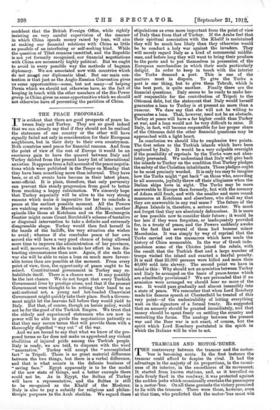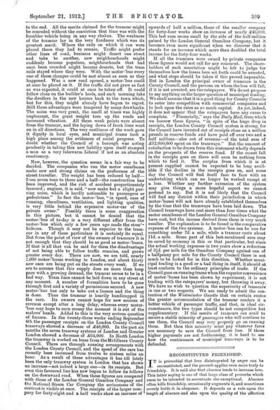TRAMCARS AND MOTOR-'BUSES. T HE controversy between the tramcar and the
motor- 'bus is becoming acute. In the first instance the tramcar could afford to despise its rival. It had the advantage in the majesty of its proportions, in the roomi- ness of its interior, in the smoothness of its movement. It started from known stations, and, as it travelled on rails firmly fixed in the roadway, it was protected against the sudden jerks which occasionally overtake the passengers in a motor-'bus. On all these grounds the victory promised to lie with the tramcar. There were those, however, even at that time, who predicted that the motor-'bus must win in the end. All the merits claimed for the tramcar might be conceded. without the conviction that time was with the humbler vehicle being in any way shaken. The weakness of the tramcar lay in the very fixedness which was its greatest merit. Where the rails on which it ran were placed there they had to remain. Traffic might prefer other lines of road, business might desert one street and take to another, new neighbourhoods might suddenly become populous, neighbourhoods that had once been crowded might become deserts, but the tram rails stayed where they were. With the motor-'bus every one of these changes could be met almost as soon as they happened. Was a new road opened, a motor-'bus could at once be placed on it. If the traffic did not grow as fast as was expected, it could at once be taken off. It could follow close on the builder's heels, and each morning take the dwellers in the new houses back to the town which, but for this, they might already have begun to regret. Still these advantages were tempered by many drawbacks. The noise was very great, the smell at times was highly unpleasant, the great weight tore up the roads and increased vibration. All these weak points were absent from the tramcar, and the laying down of fresh lines went on in all directions. The very costliness of the work gave it dignity in local eyes, and municipal trams took a high place among the evidences of social progress. To doubt whether the Council of a borough was acting prudently in taking this new liability upon itself stamped a man as a very lukewarm Liberal if not as an absolute reactionary.
Now, however, the question seems in a fair way to be decided. The companies who run the motor omnibuses make new and strong claims on the preference of the street traveller. The weight has been reduced by half— from seven tons to three and a half—the construction has been improved, and the risk of accident proportionately lessened ; engines, it is said, " now make but a slight pur- ring noise, which is hardly noticeable to passengers or pedestrians." In fact the motor-'bus, "in speed, ease of running, cleanliness, ventilation, and lighting qualities, is very little behind the expensive motor-car of the private owner." Possibly there is some exaggeration in this picture, but it cannot be denied that the motor-'bus of to-day is a very different affair from the motor-'bus which only a few years ago made the stre€ hideous. Though it may not be superior to the tram- car in any of these particulars it is certainly its equal. But from the point of view of the owners of tramcars it is not enough that they should be as good as motor-'buses. If that is all that can be said for them the disadvantage of not being able to follow traffic remains, and grows greater every day. There are now, we are told, nearly .2,000 motor-'buses working in London, and about thirty new ones are being put on the streets every week. If we are to assume that this supply does no more than keep pace with a growing demand, the tramcar seems to be in a bad way. Tram lines cannot be laid down in any street at any moment. A number of formalities have to be gone through first and a variety of permissions secured. A new motor-'bus has only to take out a licence and the thing is dune. Thus the tramcar is heavily handicapped in the race. Its owners cannot hope for new sources of revenue except after a long delay, whereas every motor- 'bus may hope to earn money the moment it is out of the makers' bands. Added to this is the very serious question of finance. In the twenty-three weeks ending September 4th the passenger receipts on the London County Council tramways showed a decrease of £48,000. In the past six months the seven tramway systems of London and Greater London showed a decrease of £64,000. In North London the tramway is worked on lease from the Middlesex County Council. There are through running arrangements with the London County Council, and the speed of the cars has recently been increased from twelve to sixteen miles an hour. As a result of these advantages it has till lately been the only tramway system in London that has shown an increase—not indeed a large one—in its receipts. But even this favoured line has now begun to follow its fellows on the downward road. When these figures are compared with those of the London General Omnibus Company and the National Steam Car Company the seriousness of the contrast is visible at once. The receipts of the larger com- pany for forty-eight and a, half weeks show an increase of upwards of half a million, those of the smaller company for forty-four weeks show an increase of nearly £45,000. This last sum seems small by the side of the half-million gained by the London General Omnibus Company, but it becomes even more significant when we discover that it stands for an increase which more than doubled the total income for the forty-four weeks.
If all the tramcars were owned by private companies these figures would not call for any comment. The share- holders of each association might be left to judge for themselves how the losses here set forth could be arrested, and what steps should be taken if this proved impossible. But in London the principal owner of tramcars is the County Council, and the persons on whom the loss will fall, if it is not arrested, are the ratepayers. We do not propose to say anything on the larger question of municipal trading. We shall assume that it is a good thing for County Councils to enter into competition with commercial companies and to look upon the rates as so much capital. As yet, indeed, it does not appear that the ratepayers have any cause to complain. " Financially," says the Daily Mail, from which we borrow these figures, " in spite of the huge drop in receipts, the London County Council system is strong, for the Council have invested out of receipts close on a million pounds in reserve funds and have paid off over two and a. half millions—also out of revenue—of the total sum of £12,000,000 spent on the tramways." But the amount of satisfaction to be drawn from this statement wholly depends on the prospects of the reserve fund. If the recent fall in the receipts goes on there will soon be nothing from which to feed it. The surplus from which it is at present supplied cannot be expected to be long avail- able if the decline in the receipts goes on, and some day the Council will find itself face to face with an undertaking which can no longer be worked except at a loss. Whether any further extension of the system may give things a more hopeful aspect we cannot pretend to say. But it is not likely that the Council will find any district within their jurisdiction in which motor-'buses will not have already established themselves by the time that the tramways have been laid down. The Council tramways have cost more than four times what the motor omnibuses of the London General Omnibus Company have cost, but the income derived from them is very much smaller. The explanation is to be found in the comparative expense of the two systems. A motor-'bus can be run for something under 7d. a mile, while a tramcar costs about 11d, a mile. Some part of this last-mentioned sum may be saved by economy in this or that particular, but since the actual working expenses in two years show a reduction of 3td. per mile for the Omnibus Company against one of a halfpenny per mile for the County Council there is not much to be looked for in this direction. Whether muni- cipal trading is a good or a bad thing in itself, it should at least conform to the ordinary principles of trade. If the Council goes on running trams when the superior convenience of motor-'buses has been shown by experiment, it is not trading with the ratepayers' money, but throwing it away. We have no wish to question the superiority of tramcars in one or two respects. We are ready to admit the con- tention of the Westminster Gazette that on certain routes the greater accommodation of the tramcar renders it a better vehicle of passenger traffic, and that, in ideal cir- cumstances, the two types should be not competitive but supplementary. If the merits of tramcars can avail to secure a stable minority of passengers who will continue to use them, the Council may very properly go on running them. But then this minority must pay whatever fares are necessary to save the Council from loss. If these higher payments are not forthcoming, it is bard to see how the continuance of municipal tramways is to be defended.











































 Previous page
Previous page